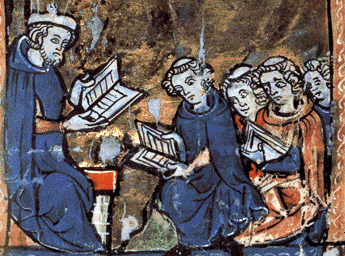Lausavísur §
Edited by Russell Poole
land ‘land’
land (noun n.; °-s; *-): land < landvǫrðr (noun m.): land-guardian
[2] landvǫrðr Hǫrða ‘land-guardian of the Hǫrðar [NORWEGIAN KING = Haraldr]’: Kennings of this type are often merely conventional, with ethnic names such as Hǫrða(r) ‘people of Hǫrðaland (Hordaland)’ standing as pars pro toto for the Norwegian people. However, there may be political reality to the conventional expression here, as suggested by Andersen (1977, 96), since the inherited power-base of the Gunnhildarsynir (Eiríkssynir) was south-west Norway (modern Vestlandet, including Hordaland; cf. ÍF 26, 200). Bagge (2004, 191-4) also notes specifically that their leader Haraldr appears to have taken over Hordaland from Hákon góði, who had affiliations with it through his mother.
Closevǫrðr ‘guardian’
nom.
[2] landvǫrðr Hǫrða ‘land-guardian of the Hǫrðar [NORWEGIAN KING = Haraldr]’: Kennings of this type are often merely conventional, with ethnic names such as Hǫrða(r) ‘people of Hǫrðaland (Hordaland)’ standing as pars pro toto for the Norwegian people. However, there may be political reality to the conventional expression here, as suggested by Andersen (1977, 96), since the inherited power-base of the Gunnhildarsynir (Eiríkssynir) was south-west Norway (modern Vestlandet, including Hordaland; cf. ÍF 26, 200). Bagge (2004, 191-4) also notes specifically that their leader Haraldr appears to have taken over Hordaland from Hákon góði, who had affiliations with it through his mother.
CloseHǫrða ‘of the Hǫrðar’
[2] landvǫrðr Hǫrða ‘land-guardian of the Hǫrðar [NORWEGIAN KING = Haraldr]’: Kennings of this type are often merely conventional, with ethnic names such as Hǫrða(r) ‘people of Hǫrðaland (Hordaland)’ standing as pars pro toto for the Norwegian people. However, there may be political reality to the conventional expression here, as suggested by Andersen (1977, 96), since the inherited power-base of the Gunnhildarsynir (Eiríkssynir) was south-west Norway (modern Vestlandet, including Hordaland; cf. ÍF 26, 200). Bagge (2004, 191-4) also notes specifically that their leader Haraldr appears to have taken over Hordaland from Hákon góði, who had affiliations with it through his mother.
Closebenja ‘of wounds’
1. ben (noun f.; °-jar, dat. -; -jar , gen. -a(var. EiðKrC 402¹³: AM 77 4° D)): wound
Closebenjum ‘’
1. ben (noun f.; °-jar, dat. -; -jar , gen. -a(var. EiðKrC 402¹³: AM 77 4° D)): wound
Closebugz ‘’
Closeó ‘the’
ó- ((prefix)): un- < ófolginn (adj./verb p.p.)
[5] ófolgin ‘unconcealed’: An understatement for ‘unsheathed, drawn’. The word may possibly resonate against Lv 8/8 folginn ‘concealed’, which refers to the standard accusation against Haraldr, that he kept his wealth concealed.
Closefolgin ‘unconcealed’
2. fela (verb): hide < ófolginn (adj./verb p.p.)
[5] ófolgin ‘unconcealed’: An understatement for ‘unsheathed, drawn’. The word may possibly resonate against Lv 8/8 folginn ‘concealed’, which refers to the standard accusation against Haraldr, that he kept his wealth concealed.
Closeylgjar ‘the she-wolf’
ylgr (noun f.; °acc. -i): she-wolf
[5, 7] til fyllar ylgjar ‘providing the she-wolf with its fill’: Lit. ‘to the satiety or fullness of the she-wolf’.
Closespells ‘’
Closetil ‘providing’
[5, 7] til fyllar ylgjar ‘providing the she-wolf with its fill’: Lit. ‘to the satiety or fullness of the she-wolf’.
Closefyllar ‘with its fill’
[5, 7] til fyllar ylgjar ‘providing the she-wolf with its fill’: Lit. ‘to the satiety or fullness of the she-wolf’.
Closefullegg ‘fully edged’
fulleggr (adj.): [fully edged]
[8] fullegg ‘fully edged’: A hap. leg., though cf. adjectives such as harðeggjaðr ‘hard-bladed’ and skarpeggjaðr ‘sharp-bladed’ (LP: fulleggr, harðeggjaðr, skarpeggjaðr). Editors have translated the cpd as ‘fully sharp’ (fuldskarpe, Skj B), ‘piercing’ (bitur, ÍF 26, Hkr 1991) or ‘sharp, keen’ (hvöss, ÍF 29), but fullegg may be more specific. Single-edged swords are known from the beginning of the Viking Age but the more prevalent type was a double-edged weapon that lent itself to slashing movements (Graham-Campbell and Batey 1998 , 35-6).
Closegullu ‘resounded’
gjalla (verb): to scream, shriek; to repay, return, pay for
[8] gullu ‘resounded’: The pl. verb form confirms that svell ‘icicles’, and hence the sword-kenning, is pl. Konráð Gíslason (1892, 70) explains this pl. as implying that Haraldr’s habitual behaviour in battle is being described, rather than his conduct in any specific battle; or perhaps it was considered a distinction for a leader to use (and break?) a series of swords.
CloseTeaching text: text section
Here you can see a piece of text. Clicking on words in the text will show you the dictionary headword, grammatical information and notes on how the word is used.
You should pay careful attention to the explanation of each word. You can test your knowledge using the translation and other exercises.
In some cases there may be audio of a modern Icelandic rendition of the text on this page.
